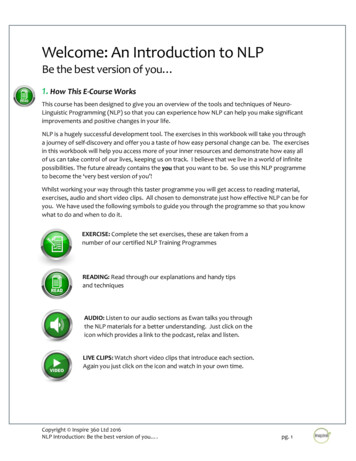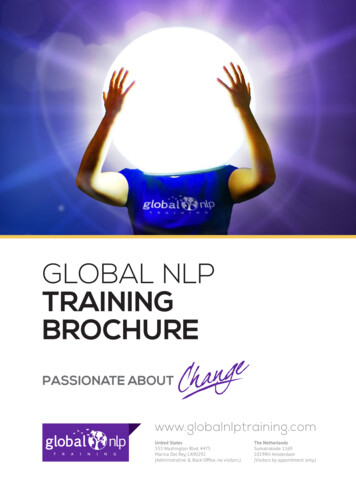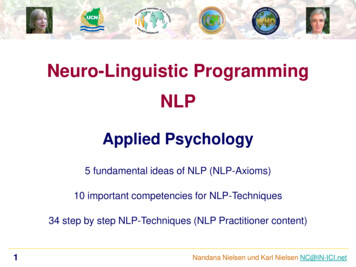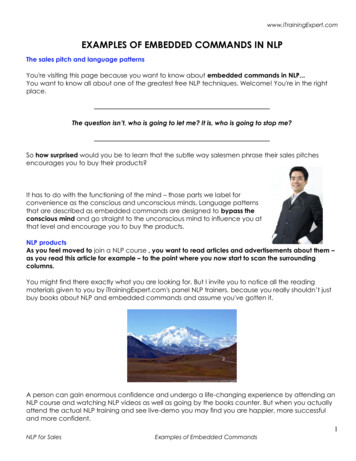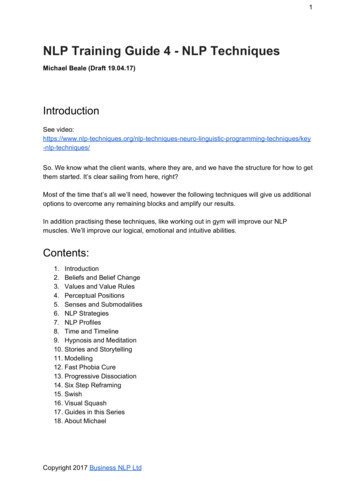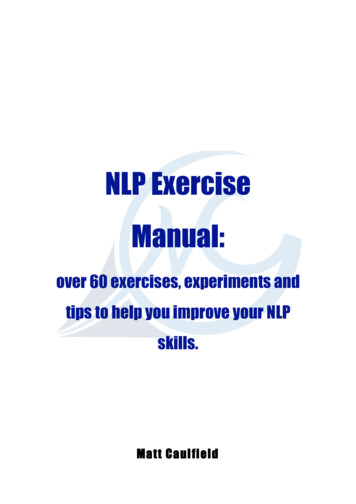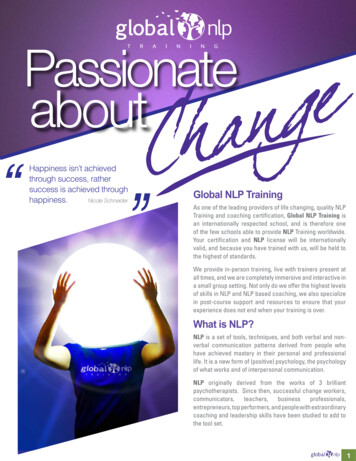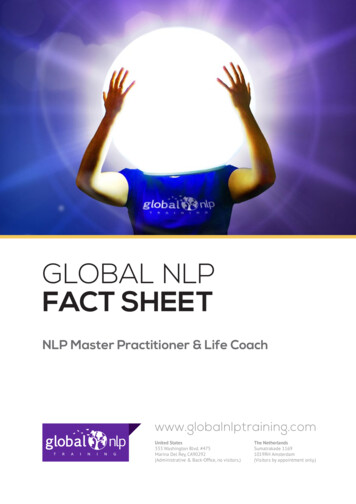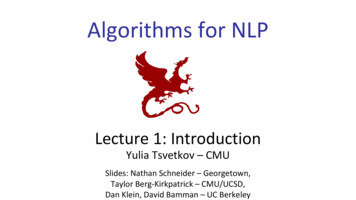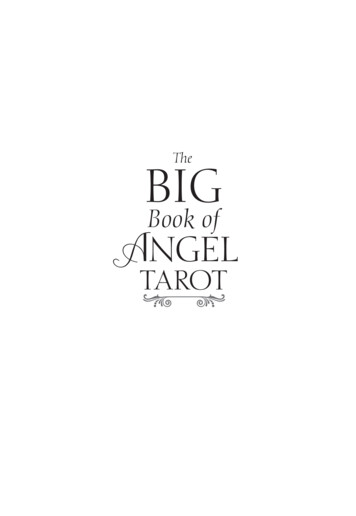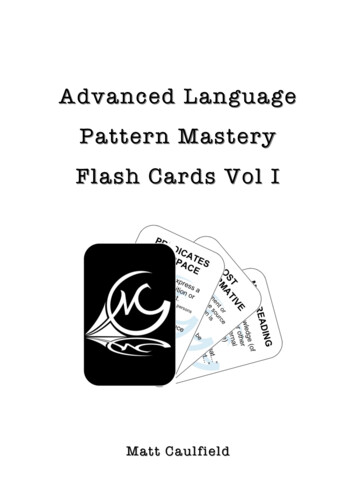
Transcription
Advanced LanguagePattern MasteryFlash Cards Vol IMatt Caulfield
2010 Matt CaulfieldThis entire document is copyright to Matt Caulfield. The right to sell it as abook or ebook is strictly reserved.
IntroductionWhen I completed my Master Practitioner training in 2001 I developed a set offlash cards (just written on index cards to begin with) and a series of exercisesand games to play to practice and get good at the advanced languagepatterns I had learned.When I started teaching NLP in 2003 people continually asked me about thecards and how to use them, so I got a limited number printed and gave themout as part of the training literature, or sold them (for 19.99 a set). If youhave a set of these cards, keep hold of them, they are very rare; I don’t evenhave a set any more!I recently came across the original pdf designs for the cards, so (afterupdating them and tarting them up a bit) I have released them for your benefitas a pdf download.To use these cards, print them out onto card (or print them on paper and stickthem to card), I have included a handy card back for you to use on them if youwish! If you really want to you could even laminate them.The secret is to use them every day, even if it is just one card for 5 minutes. Ifyou do that you will be surprised how quickly you master these patterns.The great thing with having them as a pdf, rather than a hard copy, is if youlose a card or your set becomes a bit tatty, you can just print out a new one!I hope enjoy them and find them useful,Matt Caulfield
A Refresher on Basic GrammarWhen I start teaching language patterns on my trainings I always run throughsome basic grammar before I begin. If you are unsure of basic grammar, youare going to struggle to get your head round these advanced patterns (andvery few people have thought about grammar since their school daze).So, here we go:Verb:a word to express the idea of action, happening or being (a“doing” word).Noun:refers to a person, place or thing (a “naming” word).Pronoun:“she”, “he”, “it”, etc, to replace a noun.Adverb:adds information to a verb: running fast.Adjective:adds information to a noun or pronoun: Dave is happy.Predicate:(grammar) the part of the sentence in which something is saidabout the subject: Dave (subject) went home (predicate).
Tips for Learning These Advanced Patterns1. The labels are only a guide. You will probably have noticed that someof the examples on the cards contain more patterns than the one it isbeing used to illustrate. This because language is complex andpatterns rarely occur independently. Don’t get stuck just trying topigeonhole every statement you hear into one or more category. It isunnecessary.2. You don’t need to learn the labels. They are the least important part ofthese cards. It is more important to be able to recognise, generate andknow what to do with the patterns.3. When generating the sample sentences, think of simple aim you wantto achieve, for example, you may want to put someone into a trance orsell something.4. Set a goal, develop a plan and stick to it!5. Start slowly (otherwise you may overwhelm yourself), just pick onecard a day to begin with and listen out for, and generate, that pattern.6. Have FUN! Enjoying what you are doing will make you learn muchfaster.7. It must sound like naturally spoken, “normal”, language. If it sounds likehypnotic mumbo jumbo, it will not be as effective.8. Practice good tonality (for more information see “Developing YouDynamic Voice” audio programme at www.mattcaulfield.co.uk).
Suggested Beginner Exercises1. Get a notebook and generate examples of each of the languagepatterns.2. Draw three cards at and random and construct a paragraph with the 3language patterns in it.3. Draw a card (or more if you want to) a day and use that as the “patternof the day”, make the effort to get it into everything you say and listenout for it (make notes of particularly interesting variations of it).4. If you hear a meta model pattern REMEMBER you do not need tochallenge it. However, it is good practice to think of a way it could bechallenged.For many more suggestions on how to practice language pattern drillsplease see the “NLP Exercise Manual” at www.mattcaulfield.co.uk
MIND READINGCAUSE/EFFECTclaim to knowledge (ofyour own or otherpersons internalexperience)will, will make, cause,requires“I know you think that.”“I am sure your must.”“Eating that chicken willmake me sick”COMPLEXEQUIVALENCEmaking two differentexperiences have thesame meaning (X Y)“He doesn’t love me, hedoesn’t buy me flowers”how do you know?META MODELMETA MODELMETA ness Matt Caulfield Matt CaulfieldLOSTPERFORMATIVENOMINALISATIONSvalue judgement oropinion where the sourceof the assertion ismissing.“It is a good thing to bebusy”when a complex processhas become fixed into athing.turns verbs into nouns. Matt CaulfieldPREDICATESOF TIMEwords that express asense of time.“I used to be able to.”“I have depression”who says?META MODELDistortion/SemanticIll-formedness Matt CaulfieldMETA MODELDistortion/SemanticIll-formedness Matt CaulfieldMETA MODELDistortion/SemanticIll-formedness Matt CaulfieldPREDICATESOF SPACESENSORYPREDICATESwords that express alocation, position ormovement.words that express aparticularly sensorysystem.precludes exceptions oralternative choices.often corresponds to the personssubmodalitiesoften corresponds to the personsprimary representations system (atthat time)all, ever, never, always,Only, Just“I need some distanceon this.”META MODELDistortion/SemanticIll-formedness Matt Caulfield“It feels like.”“I can see myself.”UNIVERSAL andLIMITEDQUANTIFIERS“I always do that”“It is just that.”META MODELMETA on / Limits ofSpeakers Model (Map) Matt Caulfield Matt Caulfield
MODALOPERATOR OFNECESSITYMODALOPERATOR OFPOSSIBILITYMODALOPERATOR OFDESIREshould, must, need to,have tocan, could, maybe,possiblylike to, love to“I should really do that”“I can do that, if Iwanted.”“I would love to dothat!”META MODELMETA MODELGeneralisation / Limits ofSpeakers Model (Map)Generalisation / Limits ofSpeakers Model (Map) Matt Caulfield Matt CaulfieldMETA MODELGeneralisation / Limits ofSpeakers Model (Map) Matt CaulfieldSIMPLEDELETIONCOMPARATIVEDELETIONmost or all specificnouns missing.where what is beingcompared is deleted.“.it can be deeplysatisfying.”“He is better than me”“Nobody respects me”at what?who, specifically, doesn’trespect you?META MODELMETA MODELDeletion / InformationGatheringDeletion / InformationGatheringMETA MODEL Matt CaulfieldUNSPECIFIEDVERBSgeneralised action, notspecified.“He hurt me”how did he hurt you?META MODELDeletion / InformationGathering Matt Caulfield Matt CaulfieldGENERALISEDREFERENTIALINDEX (NOUNS)people, someone,something, certain, theyLACK OFREFERENTIALINDEXthe reference of thestatement is missing.Deletion / InformationGathering Matt CaulfieldLINKAGE/ IMPLIEDCAUSATIVEas, while, during,before, after, following,whenAll dogs?“While you become morecomfortable, you noticehow much more relaxedyou are already feeling.”META MODELMILTON MODEL“Dogs are bad.”Deletion / InformationGathering Matt CaulfieldCausal Modelling Matt Caulfield
SUBORDINATECLAUSE OFTIMEbefore, after, during, as,since, prior, when,ORDINALNUMBERSfirst, second, third, etcindicating an order.“Just before we signthe order form.”“You may find your leftarm will start to relaxfirst.”MILTON MODELMILTON MODELPresuppositionsPresuppositions Matt CaulfieldAWARENESSPREDICATES Matt CaulfieldADVERBS ANDADJECTIVESUSE OF “OR”“I don’t know if your leftarm or right arm willrelax first.”MILTON MODELPresuppositions Matt CaulfieldCHANGE OFTIME VERBSAND ADVERBSknow, notice, aware,realise,easily, curious, deeply“I don’t know if you havenoticed yet that.”begin, end, stop, start,continue“You can deeply relax”“You can continue thisrelaxation process for afew minutes.”MILTON MODELMILTON MODELMILTON MODELPresuppositions Matt CaulfieldCOMMENTARYADJECTIVESAND ADVERBSfortunately, luckily,happily, surprisinglyPresuppositions Matt CaulfieldPresuppositions Matt CaulfieldEMBEDDEDCOMMANDSANALOGUEMARKINGhiding a suggestion in alarger sentence.mark a suggestion in alarger sentence withsome verbal ornonverbal behaviour.“People are oftenamazed that you cango into a trance, soeasily and quickly.”“You can relax now, orin a few minutes.”MILTON MODELMILTON MODELPresuppositionsIndirect Elicitation PatternsMILTON MODEL“Fortunately, you don’t needto know all the labels to beeffective with these languagepatterns” Matt Caulfield Matt CaulfieldIndirect Elicitation Patterns Matt Caulfield
stions placed in alarger sentences tocreate a responsepotential.proceeding what youwould like the person todo with a “don’t”.a command presented as ayes/no question.“I am curious to knowwhat you want out of anew car.”“Don’t rush.”“Can you shut the door?”MILTON MODELMILTON MODELMILTON MODELIndirect Elicitation PatternsIndirect Elicitation Patterns Matt Caulfield Matt CaulfieldPOSTULATESIndirect Elicitation Patterns Matt CaulfieldPHONOLOGICALSYNTACTICSCOPEwords that sound the samebut have differentmeanings.where the function of aword cannot bedetermined by thecontext.where it cannot bedetermined how muchof a sentence aadjective, verb oradverb applies to.eye/I, knows/nose,right/write“They were milkingcows”MILTON MODELMILTON MODELAmbiguityAmbiguity Matt CaulfieldPUNCTUATIONoverlapping 2 distinctand separate sentencessharing a word.“That’s right now youhave begun to relax”MILTON MODELAmbiguity Matt Caulfield Matt CaulfieldSELECTIONRESTRICTIONVIOLATIONSattributing qualities tosomething or someonewhich, by definition, cannotpossess those qualities.“The cheap cars andmotorbikes over there”MILTON MODELAmbiguity Matt CaulfieldQUOTESputting your suggestionin someone else’smouth.“The rock was sad”“Richard Bandler oftentalks about how easy itis to relax and go into atrance”MILTON MODELMILTON MODELPatterns in Metaphor Matt CaulfieldPatterns in Metaphor Matt Caulfield
CARD BACK TO PRINT OUT AND STICK TO YOUR CARDS!
flash cards (just written on index cards to begin with) and a series of exercises and games to play to practice and get good at the advanced language patterns I had learned. When I started teaching NLP in 2003 people continually asked me about the cards and how to use them, so I got a limited number printed and gave them
